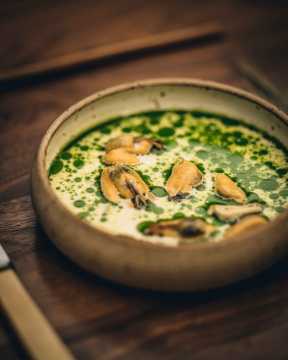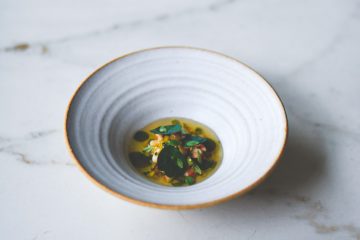“I love cooking with mussels, I generally cook with St. Austell’s, which come from Cornwall or Shetland from Scotland. Mussels are one of the UK’s most sustainable ingredients, and I usually work them in some capacity between October & March, which is when they’re in season. At The Water House Project, we change our menu seasonally, but it evolves throughout. I find that mussels are pretty versatile, so they are a constant on our menu, and in this case, specifically, I’ve paired them with artichokes and preserved lemon, a lovely flavour combination for the colder months,” says Gabriel.
CHEF’S NOTES:
This recipe serves 2 and will take 40 minutes of prep time. Some of the preparations in this recipe will give you a larger quantity than you need for this dish, but they can be kept in the fridge and used again over a period of weeks and months. The dish is best served with sourdough to mop up the broth.
For the fermented artichokes – prepare this at least 2 weeks in advance. If you choose not to ferment, you can finely dice an artichoke on the day and add it in as is.
For the Fermented Jerusalem Artichokes
Ingredients
- 1kg Jerusalem artichokes (finely sliced)
- 1L water
- 20g salt
Method
- Scrub the artichokes clean, then finely slice them to 5mm thickness.
- Sterilise a Kilner jar by first removing the rubber seal, then heating it in the oven at 160 °C for 10 minutes.
- Mix 20g table salt with 1L of water until dissolved.
- Remove the jar from the oven, and once cool, place the sliced artichokes inside. Pour the salt water over the top and place a section of parchment or clingfilm inside the jar, covering the artichokes. Submerge them under the water using a small weight such as a stone or baking beads wrapped in clingfilm. Seal the jar and store it in a cool place.
- Over the coming days and weeks, gently open and close the jar to ‘burp’ it. This will allow the carbon dioxide gas to escape as the fermentation process takes place. When the jar stops ‘burping’, the artichokes are ready.
For the Preserved Lemon
Ingredients
- 6 thick-skinned lemons
- 1.75L water
- 35g salt
- 1kg sugar
- 2 cloves garlic
- 3 bay leaves
- 1/2 vanilla pod
- 3 star anise
Method
- Cut the top and bottoms of the lemons and portion into 6 wedges.
- Place the lemons into a pan with 1L water and salt and bring to a simmer for 1 hour until tender – it’s worth cutting a piece of the lemon skin and tasting it for the right texture; it should be tender and easy to bite without being mushy.
- Pass the lemons through a colander to drain the water, then return them to the same pan adding the sugar, 750ml water, garlic cloves, bay leaves, vanilla pod and star anise. Bring to a simmer once more, remove from the heat and leave to cool at room temperature.
- Store the lemons with their cooking liquid in sealed containers or Kilner jars in the fridge. These can be kept for up to 6 months.
For the Chive Oil
Ingredients
- 1 bunch chives (20g)
- 100ml olive oil
Method
- In a jug blender, blend the chives and oil for 5 minutes until the oil begins to steam.
Set a piece of j-cloth / muslin cloth or tea towel over a sieve and pass the oil through, collecting the oil in a container below.
For the Mussels
Ingredients
- 1kg mussels (we use St. Austell’s, which come from Cornwall or Shetland from Scotland)
- 1 shallot (sliced)
- 2 tbsp fennel seeds
- 3 star anise
- 2 bay leaves
- 1 crushed garlic clove
- 2 sprigs thyme
- 1 glug of olive oil
- 175ml white wine
- 150ml double cream
- 4g salt
- juice of 1 lemon
- 50ml preserved lemon stock (from above recipe)
Method
- Clean the mussels by running them under cold water for 5 minutes, removing any large bits of seaweed with your hands, and then draining them through a colander.
- Over gentle heat, heat the olive oil and sweat the shallot, fennel seeds, star anise, garlic and thyme for several minutes until soft. Turn up the heat, add the white wine and bring to the boil. Drop the mussels into the pan and place a sealed lid on top; give the pan a quick shake and cook for 3-4 minutes. The mussels are cooked once opened fully.
- Remove the lid and, using your hands, separate the mussels from their shells; you can discard the shells.
- Pass the stock through a fine sieve into a saucepan, return the mussel flesh into the stock pan and cover with the cream, preserved lemon cooking liquid, lemon juice and salt.
- Finely dice a handful of fermented/raw artichokes and 4 preserved lemon skins and add to the pan.
- To serve, reheat the mussels in the broth until warmed through, checking the seasoning with salt and lemon juice. Add a few spoonfuls of chive oil to the pan ‘splitting’ the cream. Spoon the mussels into your bowl by pouring over the remaining stock and spooning over a little more chive oil.
Recipe courtesy of Gabriel Waterhouse, Chef Patron of The Water House Project in London.
The Water House Project
1 Corbridge Crescent Cambridge Heath
London E2 9DT
United Kingdom
Web: thewaterhouseproject.com
Restaurant Bookings: thewaterhouseproject.com/bookings
Email: enquiries@thewaterhouseproject.com
Instagram: @thewaterhouseproject
Facebook: @thewaterhouseproject



